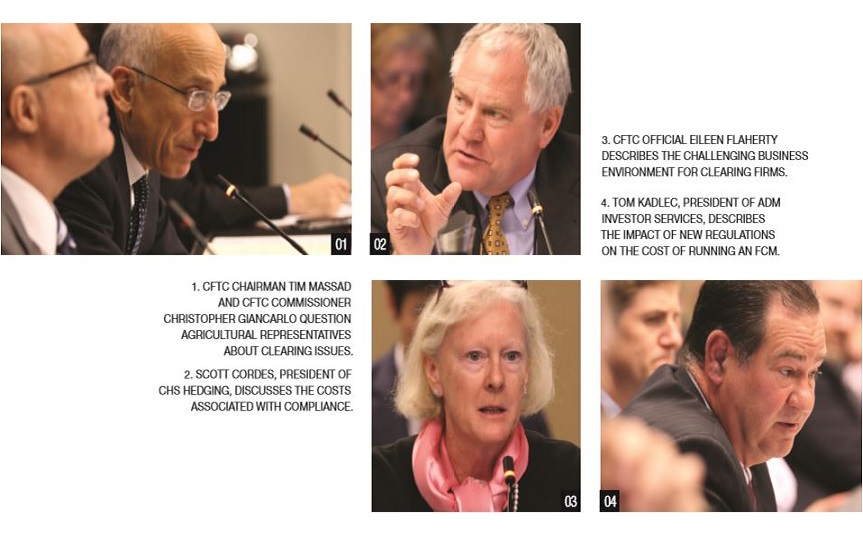Agricultural hedgers are worried about the dwindling number of futures commission merchants, particularly as financial regulations have called for more businesses to be centrally cleared.
COMMODITY FUTURES TRADING Commission officials discussed the consolidation trend among futures commission merchants with agricultural industry representatives at a Sept. 22 meeting of the agency's Agricultural Advisory Committee.
CFTC Chairman Tim Massad noted the decline in the number of FCMs over the past decade and commented on their importance to agricultural hedgers. "It's very important that we have a robust FCM industry. It's very important that all customers, particularly smaller ones, are able to access the markets effectively and efficiently," he said.
CFTC Commissioner Christopher Giancarlo warned that a decrease in the number of FCMs will add to the burdens on the farming sector at a time when farm income is falling dramatically. "We must not make matters worse by restricting the ability of agricultural producers to hedge against plunging revenues," he said.
Kevin Piccoli, deputy director of the CFTC’s division of swap dealer and intermediary oversight, gave a presentation on trends in the number of FCMs in December 2005 to December 2014. The total number of firms registered with the CFTC declined from 171 to 76 over that nine-year period and the number of firms with customer assets declined from 85 to 60.
Piccoli attributed the decrease to a number of factors such as bankruptcies, mergers, internal reorganizations and changes in regulatory status. He noted that the bulk of the decline was among smaller FCMs that typically serve commercial agricultural interests. During this nine-year period, a significant number of smaller firms holding an average of $10 million in customer funds went out of business or combined with other firms, he said.
Eileen Flaherty, director of the CFTC's swap dealer and intermediary oversight division, noted that compliance costs over the past several years have increased significantly for FCMs. She also said the low interest rate environment is a deterrent for new firms entering the business. "It's a very difficult business to be in and to make any money," said Flaherty.
Ag Interests Concerned
The agricultural advisory committee serves as a forum for agricultural interests to share their views with the CFTC and consists of a broad swathe of agricultural representatives from cotton growers to milk and pork producers. Members of the committee expressed concern about the falling number of FCMs and warned that agricultural interests rely on these FCMs to facilitate their hedging programs.
“We’re growing increasingly concerned about the health of this sector and believe that, particularly with many swaps now being pushed through clearinghouses per the Dodd-Frank mandate, we arguably need more FCMs, not less,” said Bill May, president and chief executive officer of the American Cotton Shippers Association.

Much of the discussion focused on the risk that this trend poses to the ability of customers to move their positions to another FCM, as became necessary in the aftermath of MF Global and Peregrine Financial. Members of the panel cautioned that amid those collapses and the financial reforms calling for more central clearing, customers typically must maintain business relationships with more than one FCM.
“We operate with two FCMs. Our view is we can’t afford to walk in and not be able to service our customers,” said MJ Anderson, chairman of the risk management committee of the National Grain and Feed Association and director of risk management and merchandising for The Andersons Inc., an Ohio agribusiness.
Cost of Compliance
Scott Cordes, president of CHS Hedging, noted that compliance costs have been a burden on his firm. CHS, which is based in St. Paul, Minn., is a small FCM and risk management company owned by farmers, ranchers and local cooperatives.
“Our mission is to serve agriculture,” he said. “We’ve doubled our costs around head count and compliance and we’re probably headed to triple. So we always ask ourselves, how do we continue to have the size and scale to compete?”
Tom Kadlec, president of ADM Investor Services, spoke on behalf of FIA and explained that the cost of regulatory compliance has doubled for FCMs over the past five years as a result of Dodd-Frank, the Basel capital requirements and new customer protection standards. In this new regulatory landscape, many factors have to be evaluated in considering new client business and FCMs at times are reluctant to take on new customers from other firms. “If there’s one thing that we’ve learned in the last 10 years with the crisis, it’s that we have to really dig down and do proper due diligence,” he said.
Given all of these trends, the cost of hedging agricultural risks will rise, several participants warned.
“There’s nothing we see that’s going to be lowering costs,” said Lance Kotschwar, a senior compliance attorney at Gavilon Group, an agribusiness based in Omaha, Neb., who spoke on behalf of the Commodity Markets Council. “It’s going to add cost and it’s going to put continued pressure on a number of FCMs. We don’t know exactly how, but it’s not going to be good for us,” he said.


